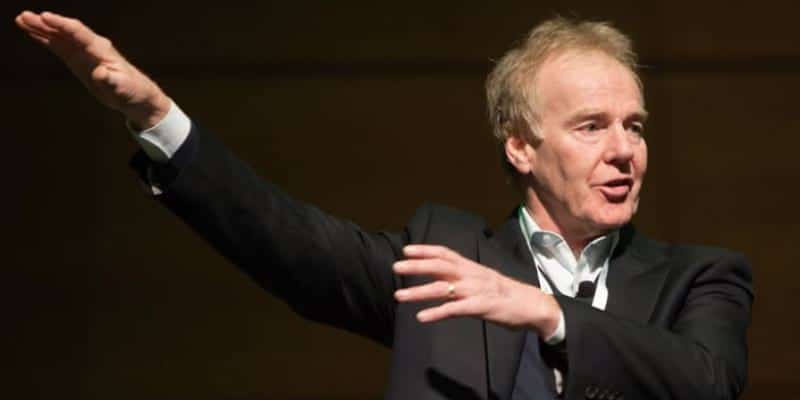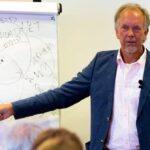Peter Senge biography and books

Peter Senge (1947) is an American scientist, teacher and director of the Center for Organizational Learning at de MIT Sloan School of Management. He is known as the author of the book The Fifth discipline (1990). This article contains his biography, quotes and publications.
Biography Peter Senge
Senge received a Bachelor’s degree (BSc.) in aerospace engineering from Stanford University. In 1973, he obtained his Master’s degree (MSc.) in social systems modelling from the Massachusetts Institute of Technology (MIT) Sloan School of Management. Peter obtained a doctorate (Ph.D.) in management in 1978.
After he had obtained his doctorate, Senge started working as an engineer in training for John H. Hopkins where he was inspired by the works of Michael Peters and Robert Fritz.
Senge gained practical experience in organizations like Ford, Chrysler, Shell, AT&T, Hanover Insurance and Harley-Davidson in the 1970s and 1980s. It was around that time that the foundations were laid for his approach on the five disciplines.
In addition to his work as an engineer, Senge kept on working at MIT. Senge published his ground breaking book the ‘The Fifth Discipline‘, which is based on his field research, in 1990. As a result, his status as an engineer changed and he was seen as a leading figure in the field of organizational development.
His theories are mainly about seeing organizations as learning instruments (Organizational Learning) in which these dynamic systems (Systemics) have to adapt themselves to changes continuously. In 1997, Senge’s book The Fifth Discipline was recognized and appreciated by Harvard Business Review and he was named the ‘Strategist of the Century’.
Learning theories and models
He is the founder of the five disciplines of learning organizations. Peter Senge also developed, with Chris Argyris, the Ladder of Inference, a powerful Decision Making tool.
Peter Senge is the founding chairman of the Society for Organizational Learning (SoL). This organization provides advice about the communication of ideas between large organizations. He is currently the director of the Center for Organizational Learning at the MIT Sloan School of Management.
Famous quotes by Peter Senge
- “Scratch the surface of most cynics and you find a frustrated idealist — someone who made the mistake of converting his ideals into expectations.”
- “People don’t resist change. They resist being changed.”
- “You cannot force commitment, what you can do…You nudge a little here, inspire a little there, and provide a role model. Your primary influence is the environment you create.”
- “the bad leader is he who the people despise; the good leader is he who the people praise; the great leader is he who the people say, “We did it ourselves!”
- “The most effective people are those who can “hold” their vision while remaining committed to seeing current reality clearly.”
- “Business and human endeavours are systems…we tend to focus on snapshots of isolated parts of the system. And wonder why our deepest problems never get solved.”
- “Collaboration is vital to sustain what we call profound or really deep change, because without it, organizations are just overwhelmed by the forces of the status quo. “
- “Courage is simply doing whatever is needed in pursuit of the vision.”
- “The world is made of Circles. And we think in straight Lines.”
- “Vision is an idle dream at best and a cynical delusion at worst – but not an achievable end.”
- “All great things have small beginnings.”
- “Don’t push growth; remove the factors limiting growth.”
- “Leadership is about creating new realities.”
- “Structures of which we are unaware hold us prisoner.”
- “Reality is made up of circles but we see straight lines.”
Books and Publications
- 2014. The dance of change: The challenges to sustaining momentum in a learning organization. Random House LLC.
- 2014. The fifth discipline fieldbook. Random House LLC.
- 2008. The necessary revolution: How individuals and organizations are working together to create a sustainable world. Random House LLC.
- 2008. Sustainability: Leadership Required.
- 2008. Presence: Human Purpose and the Field of the Future.
- 2007. In praise of the incomplete leader. Harvard Business Review, 85(2), 92-100.
- 2006. Community action research: learning as a community of practitioners, consultants and researchers. Handbook of Action Research: Concise Paperback Edition, 195-206.
- 2006. The Fifth Discipline: The Art & Practice of The Learning Organization, Deckle Edge.
- 2006. Learning together: new partnerships for new times, Journal: Corporate Governance , vol. 6, no. 4, pp. 420-430.
- 2005. Presence: An exploration of profound change in people, organizations, and society. Random House LLC.
- 2005. Missing the boat on leadership, Journal: Leader To Leader , vol. 2005, no. 38, pp. 28-30.
- 2004. Face to face: Living and learning: A conversation with Peter M. Senge, Journal: Leadership in Action , vol. 24, no. 3, pp. 20-23.
- 2003. Taking personal change seriously: The impact of Organizational Learning on management practice.
- 2001. Next industrial revolution. MIT Sloan Management Review.
- 2000. The Art and Practice of the Learning Organization. New York: Doubleday.
- 1998. The leader’s new work. Leading organizations, 439-457.
- 1998. The practice of innovation. Leader to leader, 1998(9), 16-22.
- 1997. Sharing knowledge: the leader’s role is key to a learning culture. Executive Excellence, 14, 17-17.
- 1997. Communities of leaders and learners. Harvard Business Review, 75(5), 30-32.
- 1997. The Fifth Discipline.
- 1996. Looking ahead: implications of the present. Harvard Business Review, 75(5), 18-32.
- 1996. Leading learning organizations: The bold, the powerful, and the invisible.
- 1994. The fifth discipline: The art and practice of the learning organization (p. 14). New York: Currency Doubleday.
- 1994. Modeling for learning organizations. Productivity, Incorporated.
- 1994. Putting systems thinking into practice. System Dynamics Review, 10(2‐3), 277-290.
- 1993. Transforming the practice of management. Human resource development quarterly, 4(1), 5-32.
- 1993. Communities of commitment: The heart of learning organizations. Organizational Dynamics, 22(2), 5-23.
- 1992. Systems thinking and organizational learning: Acting locally and thinking globally in the organization of the future. European journal of operational research, 59(1), 137-150.
- 1992. Mental models. Strategy & Leadership, 20(2), 4-44.
- 1992. Model-supported case studies for management education. European Journal of Operational Research, 59(1), 151-166.
- 1980. A long-wave hypothesis of innovation. Technological Forecasting and Social Change, 17(4), 283-311.
- 1978. Tests for building confidence in system dynamics models. Cambridge: System Dynamics Group, Sloan School of Management, Massachusetts Institute of Technology.
How to cite this article:
Van Vliet, V. (2010). Peter Senge. Retrieved [insert date] from Toolshero: https://www.toolshero.com/toolsheroes/peter-senge/
Original publication date: 11/14/2013 | Last update: 09/08/2023
Add a link to this page on your website:
<a href=”https://www.toolshero.com/toolsheroes/peter-senge/”>Toolshero: Peter Senge</a>











